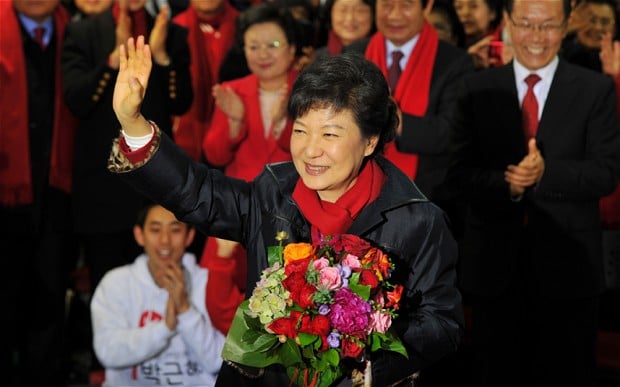
Park Guen-hye, newly elected president of South Korea. The daughter of former strongman Park Chung-hee–who ruled from 1961-79–Park Guen-hye emerged victorious after a close and contentious race on Dec. 19, 2012, and will be South Korea’s first female leader. Photo credit: AFP.
A bitter campaign. A contentious election. A close vote. A winner boosted by overwhelming support among a particular age group. A leader who must unite a politically polarized nation.
Sounds like the United States, but could also describe South Korea. On Wed. Dec. 19, the Asian nation made Park Geun-hye its first female president. In addition to the major economic and diplomatic challenges awaiting her, Park must also confront the legacy of her father, Park Chung-hee. Park Chung-hee is one of South Korea’s most influential and notorious leaders, establishing an authoritarian rule which lasted nearly 2 decades (he was assassinated in 1979). While credited with setting up South Korea’s astonishing economic growth and modernization, democracy tended to disappear during his reign. Lucy Williamson of the BBC may have put it best by saying that Park Chung-hee is “credited with laying the foundations for South Korea’s powerhouse economy but accused of doing so at the expense of democracy.”
And now his daughter takes the stage. Such is the paradoxical nature of Park Guen-hye’s victory: the first female president in a country that tends towards male-dominance; a conservative who supports certain liberal positions, especially being open to negotiating with North Korea and increased government social care spending; and receiving support key to her victory from older South Koreans, those most directly connected to living under her father’s iron fist.
After an election that wasn’t decided until several hours after ballot-counting–apparently this is considered “late” these days–Park must mend the wounds of the past and steer South Korea through a sure-to-be volatile future. Any progress she can make in soothing relations with North Korea would be a welcome development. She has also pledged to resolve a widening income gap, which will be a major challenge (sound familiar?). It will be interesting to see how Park/South Korea’s approach to this compared to the U.S.
South Korea remains a key influencer on stability in Asia. If Park Guen-hye can strengthen its democracy, the positive impacts politically, practically, and symbolically would be substantial.
For an overview of Park Guen-hye’s stance on key issues check out this overview from the Washington Post. Anyone in South Korea or elsewhere have thoughts on Park’s upcoming presidential term? What are the biggest challenges she is facing? Where might she have the best chances for success? Please share by writing a comment on this post.